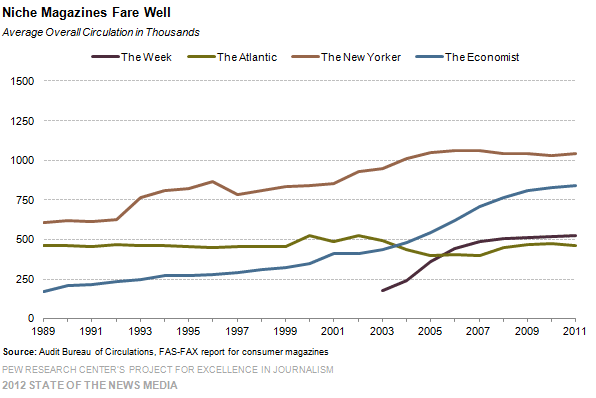Newsweek Didn’t Hear the News!
After nearly 80 years in business, Newsweek will turn out its final print magazine on December 31, 2012, to switch to an all-digital,paid subscription, format. The change has been long in the making as subscriptions and newsstand sales have been on the decline for nearly a decade. Newsweek is the latest, and the most widely read news magazine to abandon ship.
 With the advancement of the web and smartphones, we have immediate access to more breaking news than we can digest –most of which is free. Who wants to wait a week to read yesterday’s highlights, and pay for it too? Newsweek’s subscription rates show that fewer readers are willing to do so… and even that number is dwindling. In fact, since 2007, Newsweek has lost more than 50% of its subscribers, and advertising pages have plunged more than 80%…bringing annual losses to roughly $40 million.
With the advancement of the web and smartphones, we have immediate access to more breaking news than we can digest –most of which is free. Who wants to wait a week to read yesterday’s highlights, and pay for it too? Newsweek’s subscription rates show that fewer readers are willing to do so… and even that number is dwindling. In fact, since 2007, Newsweek has lost more than 50% of its subscribers, and advertising pages have plunged more than 80%…bringing annual losses to roughly $40 million.
I can’t help but wonder… did Newsweek miss the news? Why did this transition take so long and did Newsweekhave to give up on print? Will the failure to have made a timely digital transition, and cater to their customers desires, cause Newsweek to lose the competitive advantage that has earned it its top ranking position in the industry?
3 Signs Newsweek Lost Sight of its Customers’ Wishes & What You Can Learn from this Lost Brand Leader
Turning to Price as a Differentiator. Without a competitive advantage, price becomes the differentiator. Rather than respond to customers’ changing reading habits, Newsweek began to charge less and less for its subscriptions. Caving in on price is easy and common, but in the long run it can be costly. Even after cutting subscription prices, Newsweek still bowed out of print.
Price trumps value if you don’t know what your customers want, or you know but don’t know how to sell it. What else could Newsweek have offered customers instead of the lowest price?
Relying on Legacy. Newsweek’s lethargic acceptance of customers’ changing needs might offer a clue that Newsweek relied too heavily on its 79 year-old reputation. Too many companies with big brand names or long history lean too heavily on that recognition. Longevity alone is not at the top of most consumers’ buying criteria. Although it can be a sign of a quality;longevity can also associate with out-of-date and out-of-touch with today’s customers.
Ignoring Relevance. Newsweek failed to focus on relevant selling. Their customers were leaving print for digital media at a staggering rate – this wasn’t rocket science. Double-blind market research is a fantastic way of gaining insight to customer demands. But I can argue that they didn’t even need to conduct research to figure out what their readers really wanted… they had all the necessary data to sell relevantly and cater to their markets’ changing perspective, yet they remained whole heartedly committed to print.

I can’t help but think – had Newsweek focused on remaining relevant to its customers, might it have enjoyed a revival of its print publication?
Reflections:
- How do your customers define value? And how often do you reevaluate how your customer’s definition of value has changed?
- Do you make assumptions about what your customers and prospects value? Do you validate those assumptions?



